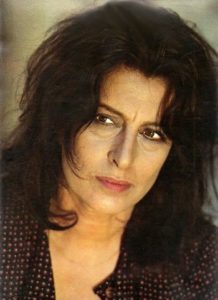By: Tony Traficante, a Contributing Editor for ISDA
A spit fire, obstinate, passionate, with an explosive temper, these are just a few words describing the remarkable actress Anna Magnani.
Born March 7, 1908, she was abandoned by her unmarried teenage mother and grew up with maternal grandparents. She did not know her father.
Some report he was Egyptian, others say he was Calabrese. Some even claimed Anna was born in Egypt, but Anna, proud of her Italian heritage, maintained, “I am Italian; I am Roman!”
Anna worked her way through Rome’s Academy of Dramatic Art, singing in nightclubs and bars. For years, she performed in a number of different theater locales and even joined a theater group in South America.
Magnani’s movie debut, in a leading role, came in “La Cieca di Sorrento” (The Blind Woman of Sorrento; 1934).
In 1945, she became an international celebrity, when film Director Roberto Rossellini featured her in his classic movie “Roma Città Aperta” (Rome the Open City).
Rossellini praised Anna’s performance as “the greatest acting genius since Eleonora Duse.”
Nicknamed La Lupa, the she-wolf, Magnani lived a life, not unlike some of the characters she portrayed in her movies.
Many of Anna’s movies cast her in roles of a dynamic, forceful, earthy lower-class woman embroiled in a spectrum of human emotions.
Playwright Tennessee Williams, captivated by her acting, wrote: “The Rose Tattoo” specifically for Anna. It was Anna’s Hollywood debut.
She won the Academy Award, in 1955, for best actress for playing Serafina, the neurotic widow.
Believing she had no chance of an Oscar, Anna did not attend the Award ceremonies. When a reporter woke her to announce she had won the award, she screamed, accusing him “You’re lying. If this is a joke, I’ll kill you!”
Finding true love was one of Anna’s greatest disappointments, as she went from one paramour to another.
In 1935, Anna married film director Goffredo Alessandrini. The marriage did not last long. Later she had a brief liaison with Massimo Serato, an Italian actor and they had a son, Lucas.
Lucas, probably her greatest love in life, was stricken with polio. Serato renounced his role to be a father and left.
Anna almost gave up her acting to care for her beloved Lucas.
Magnani’s romance with director Robert Rossellini was one of turbulence. Their quarrels were violent. In the end, Rossellini left Anna for Ingrid Bergman. Although upset, and with ego bruised, Anna continued her career and her friendship with Rossellini.
The beauty of Anna Magnani shined through in her extraordinary acting talents. Anna never considered herself a beauty. She even joked “Lasciami tutte le rughe, non me ne togliere nemmeno una. Ci ho messo una vita a farmele!” (Leave my wrinkles alone, don’t touch even one. I lived a lifetime to have them!)
Anna’s public life, as an actress, was a joy and triumph finding love from her audience she never received from a mother. Her private life was not so happy. Olivia Magnani, her loving actress granddaughter, said: “She was a sensitive, complicated, troubled soul.”
Anna Magnani died in 1973 at the age of 65 in Rome of pancreatic cancer.
She would have been happy to know thousands came to pay homage to, but also express their love for the fiercely talented and beautiful Italian actress.



